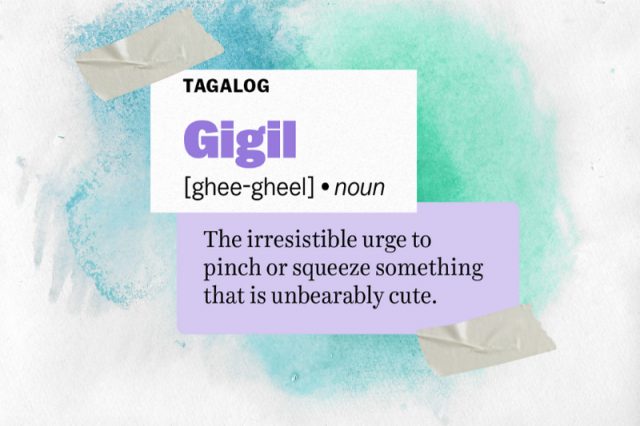The Filipino word “Gigil” was included in the list of words from other cultures Americans could learn to be happy.
Vox, an American publication, posted on June 11 that happiness among Americans is plummeting based on the annual World Happiness Report.
It cited a study from a psychologist named Tim Lomas who suggested that learning definitions of “untranslatable words” might be the key for the West to be happy again.
“Americans are only becoming more miserable, according to the World Happiness Report. Could a few words change that?” the tweet reads.
“Psychologist Tim Lomas claims that learning ‘untranslatable words’ from other cultures may be a key to being happy,” it added.
One of the words included in Vox’s rundown of foreign terms is “gigil.”
In Vox’s definition, it is a Tagalog word that refers to “the irresistible urge to pinch or squeeze something that is unbearably cute.”
1/ Americans are only becoming more miserable, according to the World Happiness Report. Could a few words change that?
Psychologist Tim Lomas claims that learning “untranslatable words” from other cultures may be a key to being happy. pic.twitter.com/a0cw1VXu1T
— Vox (@voxdotcom) June 10, 2022
This post, of course, immediately caught the attention of Filipino online users.
As of writing, Vox’s tweet garnered 163 retweets, 52 quote-retweets, 719 likes. On the other hand, the Facebook post earned 104 reactions, 21 shares and 11 comments.
Some Filipinos pointed out that they also use “gigil” to express anger, annoyance and resisting the urge to hit someone.
“Gigil can also be used when something makes your blood boil, or you’re annoyed about a situation. Like resisting the urge to hit someone,” a Twitter user said.
“This is nice! But gigil can also apply to none cute things and even when you’re annoyed,” another user tweeted.
One Twitter user also told Vox that this word is spelled as “qiqil” on the internet.
“@voxdotcom, you got the spelling all wrong. It’s qiqil. Loljk,” the user said in jest.
An online dictionary called “Tagalog Lang”, which is dedicated defining Filipino words, has a more detailed definition of the Filipino expression.
“Gigil refers to the trembling or gritting of the teeth in response to a situation that overwhelms your self-control. It’s been commonly described as an irresistible urge to squeeze something cute,” the definition in the dictionary reads.
Other untranslatable words
The rest of the words Vox posted via a Twitter thread are as follows:
- Spanish – “sobremesa”
- German – “Fernweh”
- Japanese – “Koi no yokan”
The study on finding happiness among Americans, meanwhile, was featured on Vox’s old report titled “American happiness is plummeting. Could a few words change that?” which was published on Nov. 20, 2019.
That year, the United States landed 19th place on the global happiness index.
The Philippines, on the other hand, ranked 69th at that time.
RELATED: ‘In what universe?’: How some Filipinos reacted to Philippines’ happiness ranking in Southeast Asia
Vox report explained that Loma perceived the people from the West are not as happy because of their “limited definition of happiness.”
“Other cultures have concepts of well-being that are vastly different from ours, but because they’re expressed in languages we don’t understand, Lomas argues, we’re missing out on the insights they embody,” the author said.
Samuel also cited the project Lomas started in 2015 called the “Positive Lexicography Project,” a crowdsourced database of terminology about a person’s well-being.
“This is an evolving index of ‘untranslatable’ words related to wellbeing from across the world’s languages,” the Positive Lexicography website is described.










